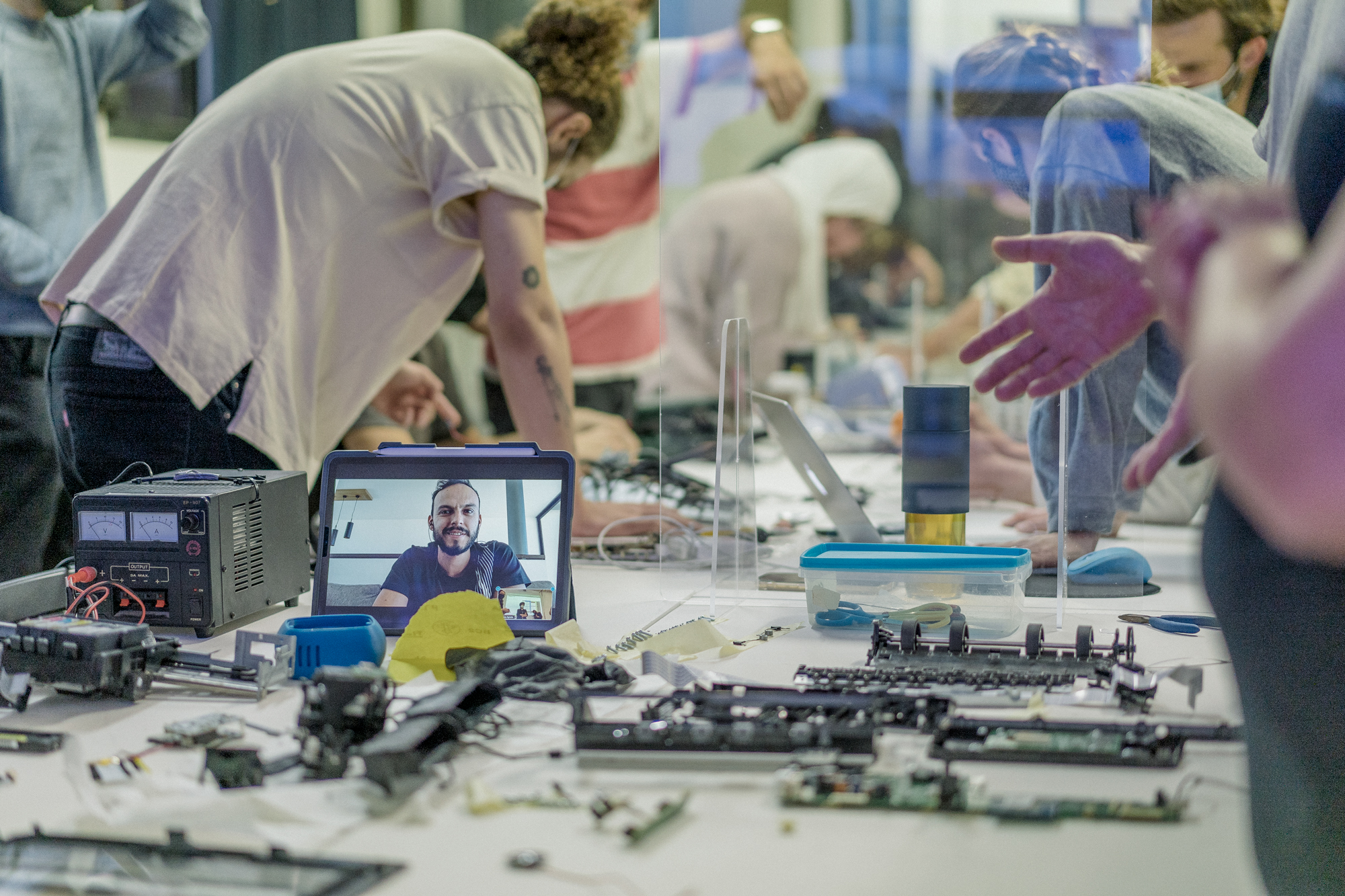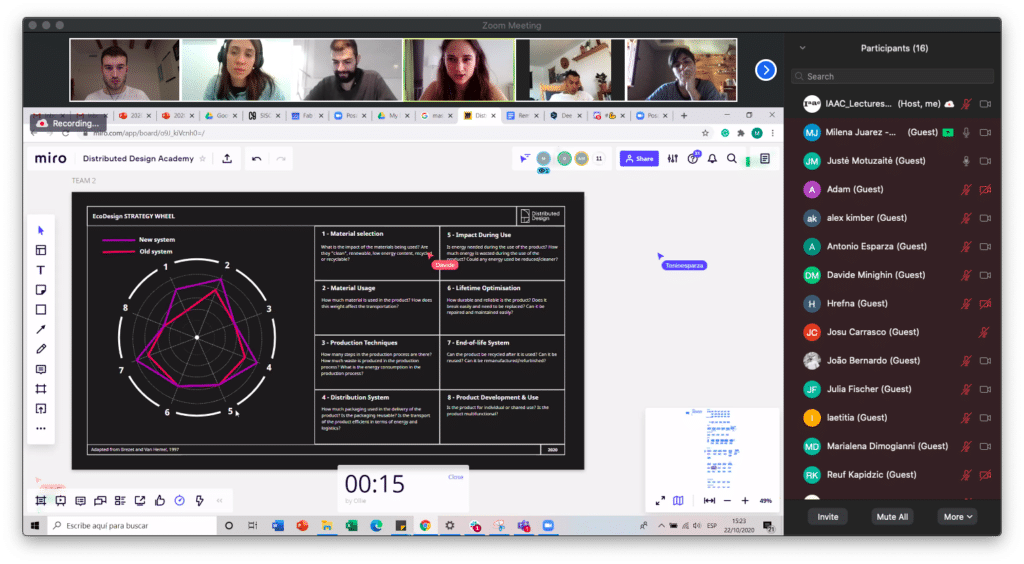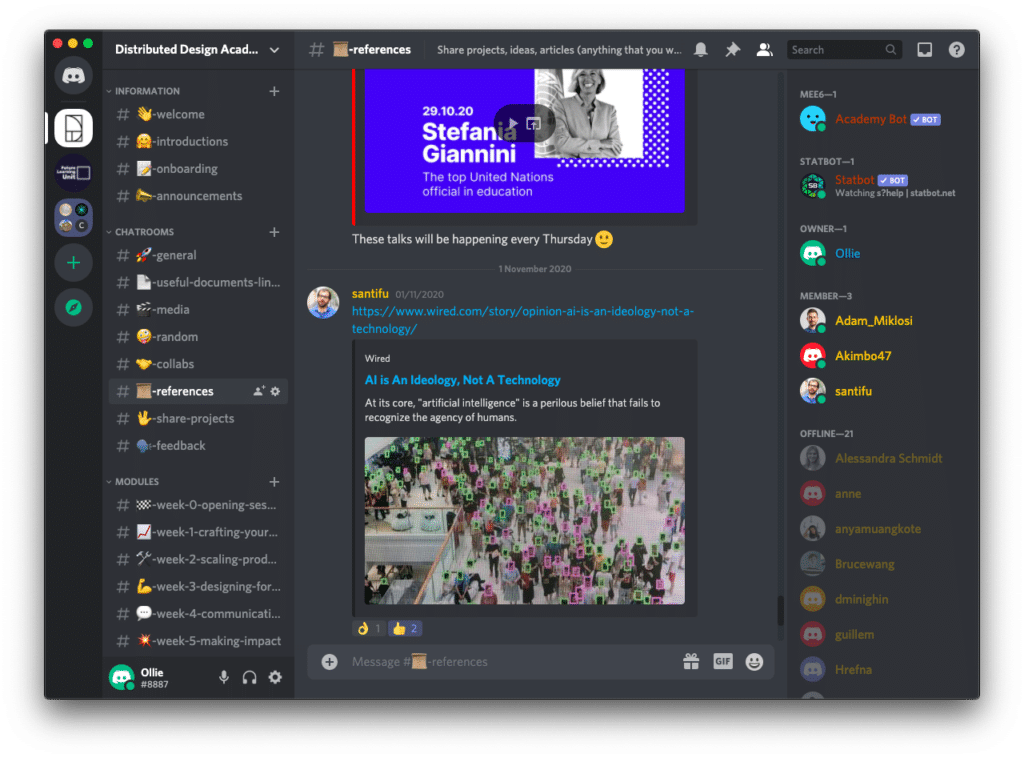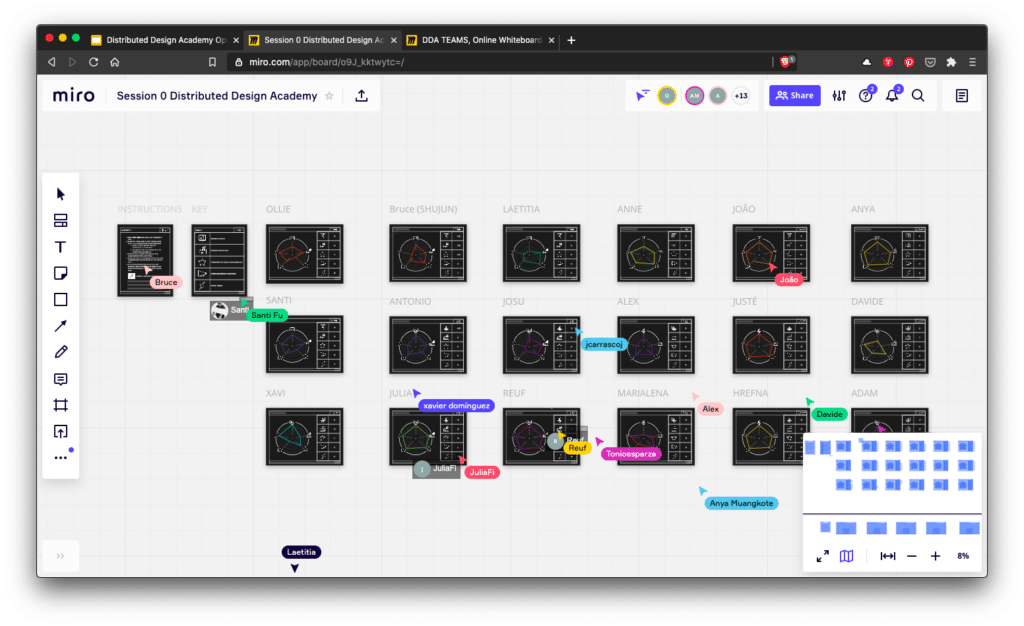
Prototyping Online Exchanges & Learning Experiences
Insights from developing online learning experiences at Fab Lab Barcelona
The COVID-19 pandemic has encouraged a rethinking of the future of how people work and learn together for many institutions, and this is certainly true for the Fab Lab Barcelona. Many of the changes brought about by the pandemic are likely to be with us for some time – if not permanently – such as increased hours working from home and online learning. As a result, understanding the positive potential of online learning and exchanges is critical to shape and develop the best possible future learning experiences and programmes. This work and research has been a major component of the work I have been involved with since joining the team at Fab Lab Barcelona this year. For example, exploring how a hybrid model of online and offline activities can be implemented successfully in the Master in Design for Emergent Futures with colleagues has formed part of this exploration.
Most of my research however has taken place through two EU projects: Distributed Design Platform through an online academy I helped facilitate in October, and MAX (Makers’ eXchange) which is a pilot policy project, co-funded by the European Union. For this project I have been involved with launching an open call: Hyper Global / Hyper Local for makers, designers, artists and craftspeople. Fab Lab Barcelona’s involvement is currently focused around the implementation of this online exchange programme that will take place through the month of February. Find more information about the programme in the previous blog post, or read on to discover some key learnings and insights from the Distributed Design Academy in the context of online exchanges and knowledge transfer.

The Distributed Design Academy
Every year the Fab Lab Barcelona organises and runs an academy as a form of knowledge exchange based around a series of projects that are carried out by Distributed Design Platform members in line with distributed design principles. This year the academy ran in a fully, online distributed manner this year due to the pandemic and travel restrictions. The concept of the academy was based around upskilling designers and makers working in digital fabrication and empowering them with a set of tools to help them meet new and emerging markets. The goal was for participants to deepen their entrepreneurial knowledge and provide inspiration and guidance on how to access new markets with modules on business model creation, communication strategies and making impact – all competencies that can be developed in a fully online environment. I captured learnings from the academy through an ongoing journal for its duration as well as discussions with participants in a dedicated closing session and survey.
A fully online exchange presented an opportunity to develop and test methodologies to explore what an academy for designers seeking to deepen knowledge can look like, in strategic areas of their practice in line with distributed design principles. The format of the academy was developed to provide a balance of three key components, providing space for knowledge transfer, hands-on activities and reflection:
Peer to Peer Session
Guided by Fab Lab Barcelona’s Future Learning research area to provide feedback on projects
Guest Speaker
Talk with Q&A session from invited speaker to provide inspiration in subject area
Interactive Session
Hosted and delivered by a Fab Lab Barcelona team member including hands-on activity to advance projects
These activities happened in synchronous, 2.5 hour weekly sessions around each of the topics in the academy – which turned out to work well in terms of timings as long as there were 20 minutes worth of breaks over that time. One key learning is that 2.5 hours is probably the limit in terms of time for an online workshop to keep people truly engaged, I think 2 hours is probably even better but we were ambitious with the amount of content to try and share as much as possible with the participants.
Participants worked in small groups of 3, each from different countries and were tasked with collaborating in a fully distributed manner on a single project for the academy’s duration. This group work took place in both the synchronous sessions during interactive sessions run by the Fab Lab Barcelona and asynchronously whenever the participants wanted to.

Creating an online community
The aim of the academy was not only to support the participants in their projects through the different lectures and interactive sessions using tools such as Miro, but to encourage knowledge exchange and build a sense of community. In a physical exchange, this is most likely done sharing a drink a day in workshops and this experience is obviously not replicable in Zoom, especially when you are getting to know people for the first time.
To try and help the participants get to know each other and learn about their practice we set up a Discord server. The Discord was the primary tool used for asynchronous communication and replaced email for the duration of the academy. The selection of this tool came from conversations with members of the Fab Lab Barcelona team who had used it before, and an ongoing research I had done over the summer into the different tools available in the online learning space. I think it was useful for the participants to have one space where they knew they could find the relevant information and have direct contact with me if they had any queries.
It was my first time setting up a Discord Server, and experimented with the type and number of channels. There was a channel for each module of the academy, one for each of the teams to get to know each other and work on their projects and other with a more social component such as sharing work and references. I think that the server was probably a little over designed and had a few too many channels, but overall I was really happy with the engagement that was created with Discord and how easy it was to have as a space for more formal announcements and sharing references and ideas with the group.

Even though the academy lasted just 5 sessions, there were some key takeaways that will contribute to future online exchanges the Fab Lab Barcelona is involved with, including MAX. One reflection I have had looking back on the Distributed Design Academy is how can the online environment be made the most out of when face-to-face contact is not possible in terms of knowledge transfer. I think the combination of asynchronous and synchronous content and delivery can have a great impact on the overall experience. For example, recorded lectures could have allowed participants to have more time with the speakers to have more of a discussion around the topics presented in the talks, and a greater amount of time to reflect and read around the topics presented.

The limitations of the online environment can also be useful and can lead to exploration, experimentation and design of new methodologies, activities with new tools. The restrictions in a tool such as Miro can dictate the kind of activities that can happen and provide useful boundaries and consistencies in activities. For instance, the whole academy this year shifted focus from previous years that were more based around the production of physical artefacts to upskilling designers in areas that they may be lacking in knowledge such as business model creation. As a result, the online setting in this case provided the opportunity for designers to develop completely new skills, rather than develop ones they already had such as material development and digital fabrication.
The Potential of Online Exchanges
It goes without saying that an exchange program for makers that can’t physically meet poses some great challenges, in a field which celebrates collaboration, experimentation, community building and making using an ever-growing collection of machinery and tools. I believe this challenge offers a great opportunity to experiment and prototype new ways of collaboration which are worth making the most of whilst the conditions that are reducing physical mobility are being imposed. One of the challenges is to create the right conditions for the cross-pollination of ideas between members of an exchange, and learnings from programmes such as the Distributed Design Academy play a big part in this process.
Final Reflections
There are of course many things that can’t be replicated in the online environment, such as becoming embedded in a new culture and community as a result of spending months in a new city. For this reason, I don’t believe the focus of online exchanges should be replacing what physical mobility offers, but take advantage of what it can offer – such as accessing knowledge and expertise in more efficient and democratic ways. I also think there is a lot of space for online interactions to become more meaningful which we will continue to prototype, develop and test in the Fab Lab Barcelona.